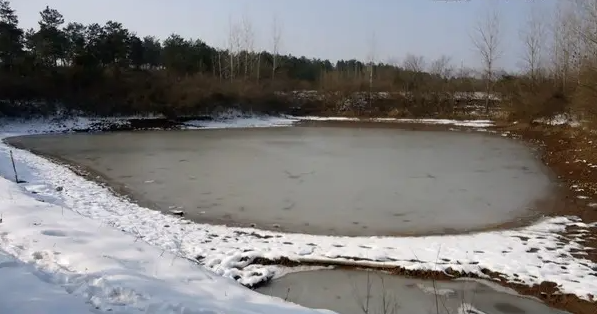News
How to manage the pond in winter? Winter management methods of aquaculture

The pond fish species enter the hibernation period with little activity. Generally, they do not eat and rely on the consumption of nutrients to maintain their lives. In the spring of the next year, their weight will generally be reduced by 10% - 20%. During this period, if the management is improper, the mortality rate of the fish species will be as high as 15% - 25%, which will affect the normal breeding of the next year, causing serious economic losses. Therefore, it is particularly important to strengthen the management of ponds in winter. Now let's talk about how to manage the pond in winter?
1. Ensure the water depth. Check whether the pond seeps outward and repair the problem pond. Add water deep enough. Generally, the ice layer in Liaoning is 0.4-0.5m in winter. To ensure that the depth of ice water is more than 1.5m, the total depth of pond water should be more than 2m. The wintering effect will be better. Changchun, Harbin and Inner Mongolia are relatively deeper.
2. Prevent frostbite. When the water temperature drops to - 3 ℃, most conventional fish will cause frostbite or even death. Therefore, before the cold wave cools down, timely increase the water level depth of the pond, add water in several times to keep the water depth of the pond at more than 1.5m, so that the bottom temperature of the water body can reach more than 4 ℃, which is helpful to prevent aquatic products from frostbite.
3. Prevent hypoxia. For the overwintering pond, the density of fish shall be reasonably controlled. For high-density pond, the dissolved oxygen shall be timely mastered, and the oxygen enrichment equipment shall be opened to make the pond water flow slightly. The ice at the mouth of the icebound pond shall be broken in time, which is conducive to the direct action of sunlight and wind on the water body, thus increasing the dissolved oxygen. The pond mouth with lean water quality should be properly fertilized to cultivate beneficial microalgae.
4. Prevent poisoning. Tangkou, which has used insecticides and bactericidal drugs before overwintering, is prone to chronic poisoning in winter because of the slow decomposition of drugs after the temperature decreases. Therefore, insecticides should be used as little as possible at low temperatures. If it is found that the bottom fish swim abnormally in the upper layer and suffer from chronic poisoning, the bottom water shall be pumped in time for water change. If the situation is serious, the bottom water shall be moved to the pond or sold as early as possible.
5. Ensure oxygen production by photosynthesis and maintain proper fertility. There is a certain amount of phytoplankton, and it is generally recommended to have a transparency of 40-50cm in winter (during the open water period, due to the interference of various factors such as wind and waves, fertilization and feeding, it is difficult to fully reflect the abundance and shortage of phytoplankton in the water. However, there is no such interference in the subglacial water body, and phytoplankton is the main factor affecting the transparency of the water body. Therefore, it is more possible to estimate the existing amount of phytoplankton in winter through transparency). If the transparency is too large, it is recommended to hang the bag. According to the water surface, the compound fertilizer is 2kg/mu, and 0.5kg/mu superphosphate can be added. Keep in mind that a small number of times should be followed. Since there are few zooplankton to control the reproduction of phytoplankton after killing insects, it is easy to cause the water body to become too fat.
6. Sweep snow and ice. Snow sweeping must be carried out in a timely manner to remove ice. If there are few ice, it can not be treated; If it's rainy and snowy for several days, the whole pool or most of it can't be ice sealed well. In the past, ice knives were used to cut it, but now it's generally recommended to use iron cones to punch several ice holes, divide several air heads, use a blower to melt several parts, and then pull out the air heads. Most of the ice reconstituted is open ice. The light intensity under the ice is closely related to the ice quality during overwintering.
7. Prevent disease. The first is to prevent bacterial diseases. In winter, some ponds need to be supplemented with fish species, which will inevitably lead to net pulling. Some fish that have been transported for a long time or operated for many times may suffer from scales falling off, swollen and injured mouth at the tail, damaged fins and other symptoms. In winter, the food intake of fish is greatly reduced, and their immunity is low, so they are easy to be infected with diseases such as water mould, gill rot, and scurvy. Therefore, it is particularly necessary to select the water temperature above 10 degrees to pull the net, minimize the intermediate transportation links, and select the source of fish species nearby. The second is to prevent parasitic diseases. After overwintering, when the water temperature rises, there is a high incidence of parasite reproduction. Common parasites include rotifers, anchor fleas, ciliates, etc., which are often accompanied by bacterial diseases such as gill rot disease. This is mainly caused by the poor physique of fish after overwintering and the poor water ecological environment. Therefore, conventional methods can be used to measure and adjust the transparency and pH of the water body, use quicklime or some bottom modification and microbial preparation products, maintain the algae phase balance, and create a good water environment to help reduce the incidence. The third is to prevent viral diseases. Common diseases after overwintering and spring start include carp spring virus disease, herpesvirus disease, etc. There is no specific treatment for viral diseases, mainly prevention. It mainly depends on thorough pond cleaning, turning over and exposure in winter, especially for the pond mouth that has been attacked in previous years. After the fish are fed, some immune enhancers, such as yeast polysaccharide and Chinese herbal medicine, can be added to the feed, which is mixed with bait to improve the immunity of the fish.
Welcome to cotact:+8618013418091(Whatsapp/Wechat)
+8618013418097(Whatsapp/Wechat)
 Alvin
Alvin hugh778
hugh778